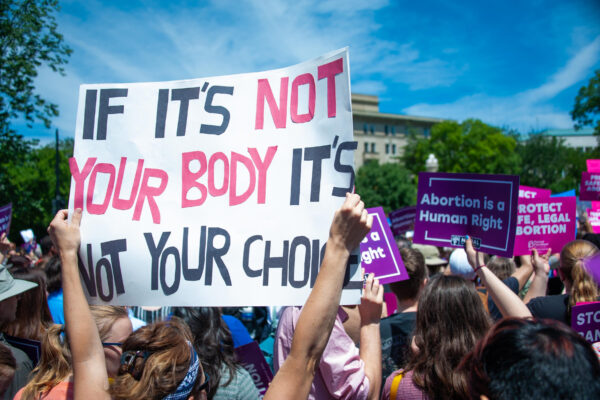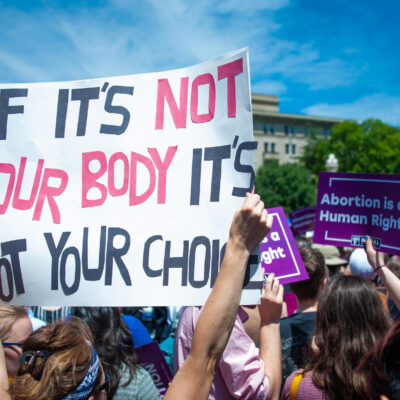Sometimes I’m truly embarrassed to be from Texas.
I moved to Las Vegas from San Antonio in 2017 for my job, but I keep abreast of the politics, especially the archaic abortion regulations. However SB8, Texas’ law banning abortions at 6 weeks, is stunning in its absurdity. It is also stunning in exactly how it was enacted.
Beyond the absolute insanity that is banning mask mandates but making it legal to sue an Uber driver that dropped a (hardly) pregnant woman off at Whole Woman’s Health, there is the way SCOTUS handled its review of the law.
In 2016, Whole Woman’s Health v. Hellerstedt was decided by the U.S. Supreme Court after the usual, multi-year process of appeals, discovery, and arguments. Ultimately, the court decided that HB2, the restrictive abortion law at issue in the case, “constitutes an ‘undue burden’ on (a person’s) constitutional right to (seek an abortion).”
As the late Justice Ginsburg so succinctly stated: “It is beyond rational belief that HB2 could genuinely protect the health of (people seeking abortions), and certain that the law ‘would simply make it more difficult for them to obtain abortion.’”
SB8, however, did not similarly require years to review. Instead, SCOTUS decided to allow the law, enacted in May, to stand after issuing a decision via its “shadow docket.” As Justice Sotomayor wrote in her dissent: “The Court’s order is stunning.”
In a shadow docket, lifechanging decisions are made in the blink of an eye, without the usual process and without the sheer volume of information typically required to analyze the constitutionality of a law.
“Shadow docket orders were once a tool the court used to dispense with unremarkable and legally unambiguous matters,” as Moira Donegan wrote in The Guardian. To bypass the typical review process for appeals, ordinarily a party could show the court that they would be irreparably harmed if the court did not intervene. However, as Donegan points out, “In recent years the court has largely dispensed with any meaningful application of the irreparable harm standard.”
This is extremely evident in the court’s decision to allow SB8 to remain law, despite the fact that pregnant people seeking abortion care in Texas will very obviously be irreparably harmed by being forced to carry pregnancies to term in clear violation of their constitutional right to abortion.
In Nevada, abortions up to 24 weeks are still legal, and will remain so. Our state Constitution guarantees this right, and it can only be changed by a vote of the people.
What we can do now is support our Texas friends. Some may travel to friendlier states for their reproductive care needs. New Mexico will probably see an influx of people seeking abortions, and eventually, I imagine the West will start to see some as well. The best way to show support is by donating to organizations who are doing the real work: Abortion clinics and the funds that help offset the costs of the procedures.
- Texas Equal Access Fund - Texas Equal Access Fund provides funding to low-income people in the north, east, and Panhandle regions of Texas who can’t afford an abortion. It also offers emotional support through a confidential text line, support group, and virtual clinic companion program
- Fund Texas Choice - The Dallas-based nonprofit Fund Texas Choice assists Texas residents with lodging and transportation expenses to abortion clinics in and out of state. It also provides information on organizations that can help with funding the procedure.
- Lilith Fund - The Lilith Fund, an Austin-based nonprofit, provides direct financial assistance to Texans in central and southern regions of the state who need an abortion. It also offers an emotional-support hotline.
- Jane’s Due Process - Jane’s Due Process helps young Texans navigate parental-consent laws and confidentially access abortion and birth control. It offers Texas teens and young people free legal support, one-on-one case management, and a text line for those needing information on birth control and family-planning services without parental involvement.
- Whole Woman’s Health - Whole Woman’s Health is an independent abortion provider that has gone to the Supreme Court multiple times to fight for abortion access in Texas. It has clinics across central and north Texas, as well as in four other states. It also provides services to the nonprofit organization Whole Woman’s Health Alliance (WWHA), which seeks to open abortion clinics in parts of the country most impacted by anti-abortion legislation.
- Indigenous Women Rising - Indigenous Women Rising (IWR) started in 2014 to bring attention to Indigenous women who relied on Indian Health Services for health care being denied access to Plan B. The group has its own abortion fund that’s open to all Indigenous folks in the U.S. and Canada who are seeking one. The fund also helps with food, gas, and child-care costs.
- The Afiya Center - The Afiya Center, or TAC for short, is a reproductive-justice organization in North Texas that provides refuge, education, and other resources to Black women. The center has its own “economic enrichment campaign” focused on funding projects for women of color living with HIV/AIDS (and those at risk). It also supports programs that are providing abortion access in the state.
- Frontera Fund - Frontera Fund works to make abortion accessible across the Rio Grande Valley, providing financial assistance regardless of immigration status or gender identity. It usually funds anywhere between $100 and $600 of abortion costs and sends a voucher to a clinic with your name and appointment information.


